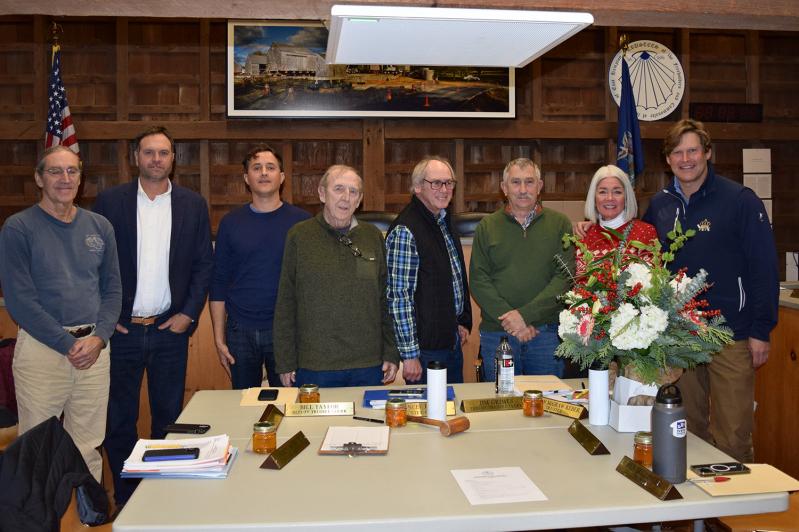At their final meeting of 2023, the East Hampton Town Trustees codified new policies on docks and other floating structures in waters under their jurisdiction, including a prohibition on construction of any new residential piers or fixed or floating docks in the entirety of Three Mile Harbor.
Monday’s vote completed a two-year process that began when the trustees enacted a moratorium on permitting and approval for new residential docks, catwalks, floating docks, floating structures, and platforms, which closely followed a 5-to-3 vote to permit construction of an 80-foot floating dock on Three Mile Harbor, the first such approval in more than 30 years. The trustees used that time to conduct a survey of all such structures, seeking to discover where docks had been built or expanded without their permission.
The trustees banned applications for docks in most waterways under their jurisdiction in 1984, extending the prohibition to all but the eastern shore of Three Mile Harbor in 1987. A Nov. 13 public hearing on their developing plans to enact new policies drew comments from five residential-dock-agreement holders.
The updated policies, which will create uniformity in residential dock management across all harbors and for all residential dock-agreement holders, were largely detailed at the trustees’ Nov. 27 meeting. The eight trustees present on Monday were unanimous in voting on most, but not all, updated policies.
All dock owners shall execute annual dock agreements to be provided by the trustees with annual invoices. The annual charge for all dock agreement holders is $1 per square foot, with a minimum total charge of $150. The annual charges for freestanding pilings and any other pilings not supporting fixed docks is $18 per piling.
Docks determined to be incongruent with a current agreement will trigger a notice granting the agreement holder six months to submit an application to reconcile the structure with the description in their existing agreement. Property owners with an annual agreement who have not constructed a dock will also be given six months to apply to renew their original construction permit, valid for a year, with up to two one-year renewals. If a dock is not constructed within three years, the trustees retain the right to deny further renewals and the agreement holder risks losing approval to build one.
The same formula applies to owners of docks determined to be in poor, dilapidated, unusable, or otherwise unsafe condition: six months to submit an application to renovate or reconstruct it and, if approval is granted, up to two renewals allowed, with agreement holders risking the loss of permission to have a dock if the work is not completed within the time frame and removal of a dock in disrepair a potential outcome.
Should future inspections reveal unpermitted expansions, owners will have six months to submit an application to bring it into compliance, with the trustees reserving the right to deny any application and require removal of the unpermitted expansion.
Dock-agreement holders are now required to notify the trustees in writing of their intent to sell, transfer, or otherwise convey their property, providing the names and contact information of all proposed transferees, or risk forfeiture of the right to maintain an annual dock agreement.
Pilings may remain installed year round at the owner’s discretion, consistent with town code. But any floating dock, removable ramp, walkway, or other movable dock or component must be removed no later than Dec. 1. The trustees will coordinate with East Hampton Town Marine Patrol to identify noncompliance.
Going forward, the trustees intend to contract with a drone photographer to conduct aerial imagery of their dock inventory, and physical inspections are to be conducted every six to 10 years.
One trustee, Jim Grimes, voted against closing what was described in earlier discussions as the “Georgica loophole,” but the other seven trustees voted in favor. Despite adopting a policy in 1984 to prohibit construction of any new residential docks or piers in Georgica Pond, Georgica Cove, Wainscott Pond, Hook Pond, or Northwest Creek, the trustees have approved several applications for “enlarged platforms” and “bottom steps” in Georgica Pond. The loophole has been closed: Bottom steps, platforms, and any other type of structure are now prohibited in those waterways and bottomlands.
Finally, the trustees voted 6 to 2 to prohibit new residential docks in the portion of Three Mile Harbor not covered by the prohibitions enacted in the 1980s. Francis Bock, the trustees’ clerk, called for a roll-call vote. Mr. Grimes again voted no, as did Ben Dollinger.
The trustees ended their meeting with a farewell to Susan McGraw-Keber, who is retiring after three terms on the board. “You have been great and wonderful,” she told her colleagues. “You have taught me so much.” She was presented with a large bouquet. “I really am going to miss all of you,” she said.




